Being an engineer today: a seminar organized by and for students of Mines Paris – PSL
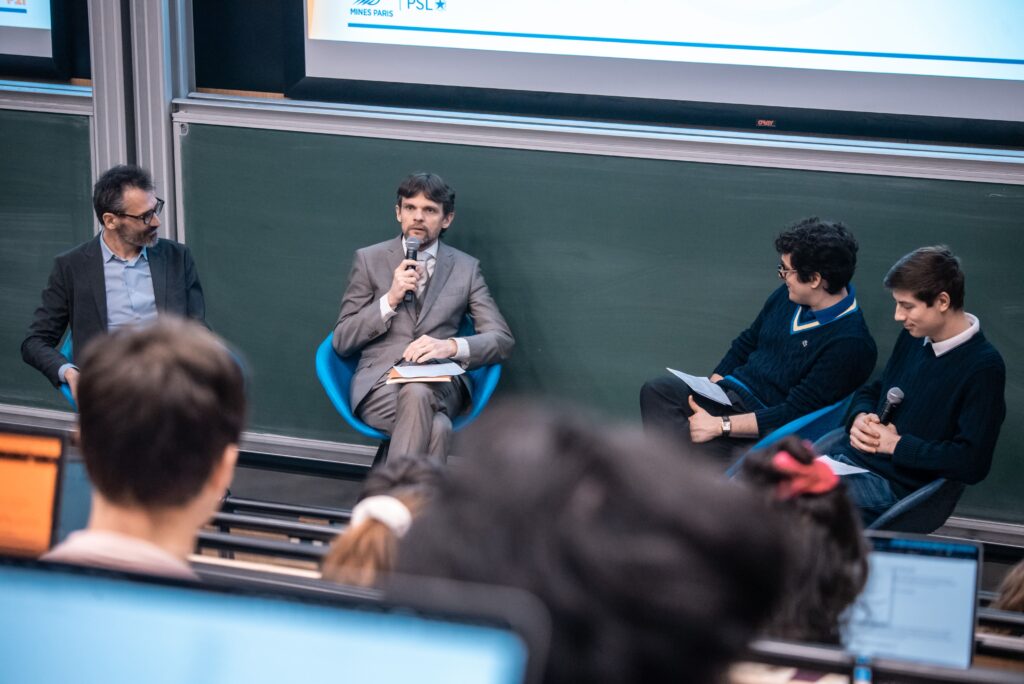

Organized completely independently by a team of thirteen student volunteers, this seminar is a real situational exercise. By choosing themes at the crossroads of the traditions and developments of the engineering profession, the objective was to give meaning to their training and to question their place in a changing world.
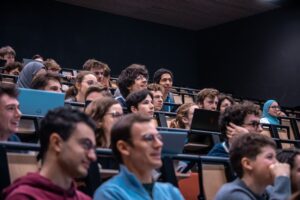
David and Olympe, leaders of the organizing team: “This year, we decided not to focus on the major challenges of the 21st century that we were made aware of during our training, but to refocus our thinking on our own situation: engineering students at the end of their course, a class about to enter the world of work and wondering about its role in society and the meaning it gives to its degree. With the whole team, we sought to provide an opening to the post-Mines period at the end of our schooling, but also to sketch a portrait of our graduating class as they prepare to leave the school grounds.”
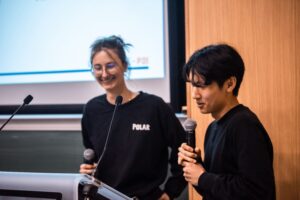
David and Olympe, organizers
Through conferences, workshops and interactive round tables, this seminar offered students a space for discussion, encouraging the confrontation of ideas and the emergence of new perspectives. A three-episode podcast will enrich this collective reflection by extending the discussions in another format.
With this initiative, the students of Mines Paris – PSL demonstrate that engineering training is not limited to the acquisition of technical skills: it is also an intellectual and human adventure, where the ability to question the world and engage with it is essential.
The first day of the seminar was dedicated to engineering education in France. It began with an original icebreaker: small group workshops where students discussed their vision of education and the role of the engineer in society.
I was personally very impressed by the convergence of responses during the discussion workshops! Even if opinions are diverse, the students systematically seek to construct a collective, nuanced response that includes all the participants. This ability and propensity to seek consensus is precious in my eyes, and it makes me proud of my training at Mines Paris – PSL!
Olympe, student 3A and organizer of the Seminar
These reflections were enriched by a historical and sociological analysis of the origin of the engineering degree, conducted by André Grelon (EHESS) and Laurent Mahieu (formerly at the CTI). They were followed by an insight into the history of training at the School, provided by Armand Hatchuel and Ludovic Bouvier.
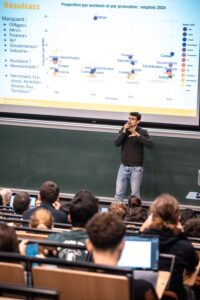
Jean Catry (P19) presents his analysis of the past career paths of the Miners
The second day focused on the meaning of the engineering profession. The day opened with a speech by Dominique Potier, MP and farmer, on the issues of responsibility and vigilance in large companies.
A highlight of the seminar was the round table on bifurcation. Engineers from very diverse backgrounds came to share their dilemmas, doubts and choices: resignation, change of sector, environmental commitment, or the choice to remain in a traditional career to move the lines from within.
The afternoon provided an opportunity to discuss the prospects for French industry with Vincent Charlet (La Fabrique de l’Industrie) and Vincent Vicard (CEPII), and then to look back at two inspiring industrial trajectories with Frédéric Pouille (Saint-Gobain) and Valérie Weigel (Sibanye-Stillwater).
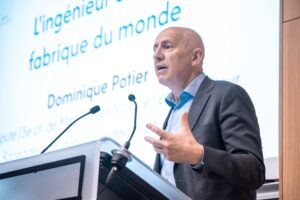
Dominique Potier, member of parliament
The third day opened up perspectives: how is the engineering profession evolving in the age of artificial intelligence, internationalization and socio-environmental upheavals?
Loïc Duflot (DGE) offered a thoughtful reflection on the impact of digital technology on the skills expected. Then, with Jérémie Ni, the participants were able to reflect on what constitutes the specificity of the “French engineer” in a globalized context.
Finally, Hélène Le Teno shared her eclectic career path as well as tools to help everyone find their way in the 21st century. Claire Nouvian, president of BLOOM, then concluded with a committed speech, calling on future engineers to make their voices heard.
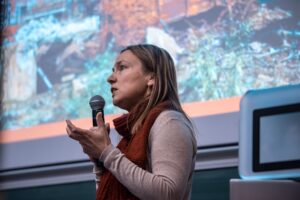
Beyond the richness of the content, this seminar was a highlight of the school year. It demonstrated the students’ ability to organize a demanding, unifying event that is open to the outside world. It also enabled them to forge links between graduating classes, to engage in dialogue with inspiring speakers, and to give each of them tools for reflection for the future.
Matthieu Mazière, Director of Studies for the Civil Engineering Cycle: “As a teacher and training manager, there is nothing more satisfying than seeing the students take ownership of their course, choose the themes and speakers during these three days of the seminar and put together this magnificent program. The roles are reversed, I just have to sit back and enjoy it.”
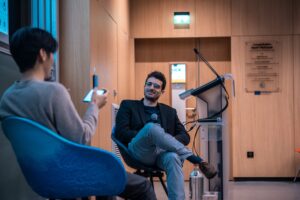
Graduation quiz with Matthieu Mazières
The seminar ended with a cocktail reception on the school terrace, a time for conviviality and shared celebration.
Inès: “I found that these few days allowed us to take a step back from our status as engineers. A historical perspective, by placing ourselves in the evolution of the professional choices of previous graduating classes using Jean Catry’s statistical analysis, by also looking at the history of engineering training and in particular that of Mines Paris – PSL, and implicitly, at the evolution of the missions assigned to engineers. It was also fascinating and moving to retrace with Ludovic Bouvier through archival research the questions asked by Mines students in 1920, 1968 and 2019 about their own training. There was also a geographical perspective, through Jérémie Ni’s insight into the differences between Chinese and French engineering.
Finally, I found it very valuable to be able to meet with today’s engineers, who took the time to share their experiences, their sources of motivation, their choices, their surprises and their questions. In this respect, I remember two highlights: the concrete testimony of a professional career in industry, and a round table of speakers illustrating different choices in the problematic area of the relationship between the activity of an engineer and social and environmental commitment. Thank you for these testimonials, which encourage us to be engineers who think and who invest their role and their responsibility as actors in our societies.”
Antonin: “The seminar was a good opportunity to re-examine my responsibilities as an engineer. I really appreciated the testimonial/round table session with engineers who had deserted or infiltrated the system. The diversity of the profiles really allowed me to question myself. In the same vein, Hélène Le Teno’s talk was extremely interesting because of the diversity of what she has been able to do and because of her frankness, which is good for the soul! Through her occasional humorous remarks, her critical and informed view of the industrial world allowed us to qualify the very pro-industry discourse that we also heard. The confrontation of the two visions was all the more relevant.
Finally, I loved Claire Nouvian’s closing speech. Her poignant speech, to say the least, frightened me and at the same time reassured me in my desire to put all my energy into fighting the causes of climate change. I leave this seminar with lots of reports to read and, above all, lots of motivation to use my skills and energy to help change things!”
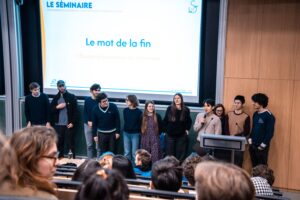
The seminar organizing team
Congratulations to the entire organizing team for their commitment, creativity and the quality of the work accomplished!
To extend these discussions, the students chose to produce a podcast in three episodes. Designed as an audio account of the year, this podcast offers an immersion in the seminar through recordings of students and speakers and extracts from the lectures.
Their aim? To offer a living and accessible record of the reflections carried out during these three days for a wider audience: future students, young graduates, but also experienced engineers or those curious about the transformations of the profession.
Each episode follows a key question from the seminar:
This project is a testament to a committed and curious generation that is keen to leave a collective mark on the world that awaits it.
The podcast will soon be available on listening platforms.
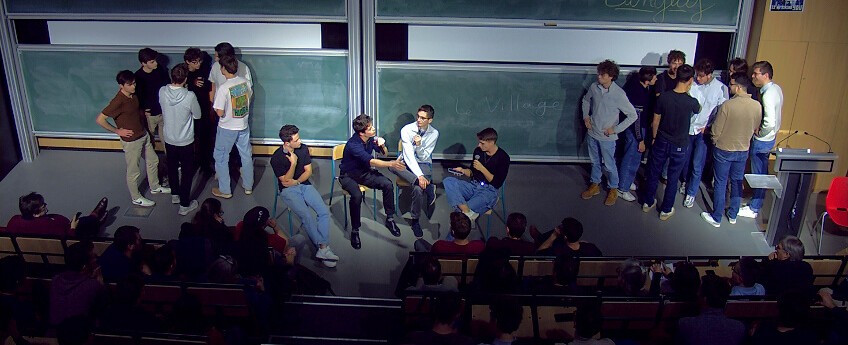
From February 24 to 26, 2025, students in the 3rd year of the Civil Engineering Cycle (P21) participated in the “Imagining Crises” course, a flagship ...